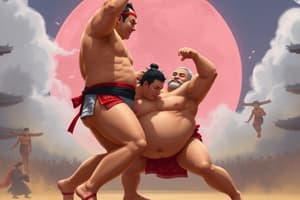Podcast
Questions and Answers
What is the estimated age of the sumo culture?
What is the estimated age of the sumo culture?
- Around 1,500 years (correct)
- Over 1,000 years
- Less than 500 years
- More than 2,000 years
Where are sumo matches often performed?
Where are sumo matches often performed?
- Traditional Japanese theaters
- Shinto shrines and temples (correct)
- Sports arenas
- Buddhist temples
What is the purpose of the 'shikiri' ritual?
What is the purpose of the 'shikiri' ritual?
- To intimidate the opponent
- To pray for victory
- To display skill and strength
- To purify oneself and the ring (correct)
What is the name of the traditional sumo ring?
What is the name of the traditional sumo ring?
What is the focus of the 'sumo-niwa' code of etiquette?
What is the focus of the 'sumo-niwa' code of etiquette?
Why do sumo wrestlers bow upon entering and leaving the ring?
Why do sumo wrestlers bow upon entering and leaving the ring?
What is the highest rank in the sumo ranking system?
What is the highest rank in the sumo ranking system?
Where do sumo wrestlers typically live and train?
Where do sumo wrestlers typically live and train?
What is the purpose of the traditional sumo diet, 'chankonabe'?
What is the purpose of the traditional sumo diet, 'chankonabe'?
What has been the impact of international influence on sumo?
What has been the impact of international influence on sumo?
Flashcards are hidden until you start studying
Study Notes
Sumo Culture
History and Origins
- Sumo's history spans over 1,500 years, originating from Shinto rituals and Japanese mythology.
- The first recorded sumo bout took place in 712 AD.
- The sport is believed to have originated in the 8th century.
Rituals and Traditions
- Sumo is deeply rooted in Japanese culture, often performed at Shinto shrines and temples.
- The "shikiri" ritual is performed before each match to purify the wrestlers and the ring.
- The "dohyo" sumo ring is made of clay and straw, constructed anew for each tournament.
Etiquette and Discipline
- Sumo wrestlers adhere to "sumo-niwa", a strict code emphasizing respect, discipline, and self-control.
- Wrestlers bow upon entering and leaving the ring, showing respect for their opponents and the sport.
Ranks and Hierarchy
- The highest rank in sumo is "yokozuna", or grand champion.
- The ranking system is based on performance and achievement, with promotions and demotions occurring regularly.
Training and Lifestyle
- Sumo wrestlers live in communal training stables, known as "heya", under the guidance of a senior coach.
- The traditional "chankonabe" diet is designed to promote weight gain and muscle growth, consisting of high-calorie, high-protein foods.
International Influence and Popularity
- Sumo has gained popularity worldwide, with international tournaments and competitions held regularly.
- The sport has been influenced by international styles, incorporating foreign techniques and training methods into practice.
Studying That Suits You
Use AI to generate personalized quizzes and flashcards to suit your learning preferences.




